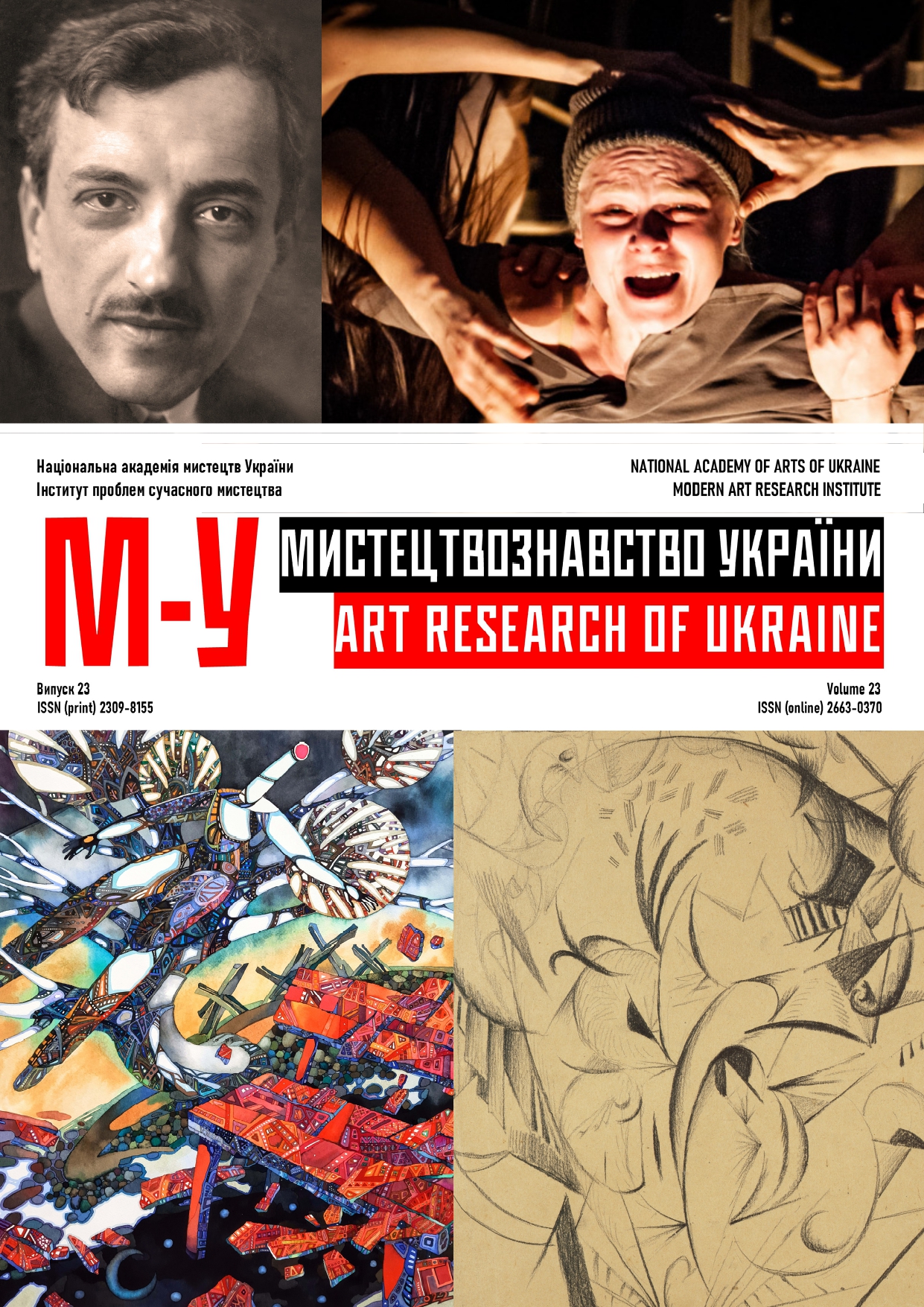«Nude vita» посткласичної регресії культуріндустрії та ретрокаузальна зворотність
DOI:
https://doi.org/10.31500/2309-8155.23.2023.294851Ключові слова:
nude vita, ретрокаузальність, регресія посткласичної доби, contemporary art, постмодернізмАнотація
У статті розглянуто феномен західних візуальних практик, відомий як «nude vita». На прикладі знакових ню-проєктів проведено аналіз соціально-філософської критики культуріндустріальної посткласичної регресії з боку незалежних українських та закордонних науковців, які досліджують ентропію художнього досвіду сучасності і наголошують необхідність негайного перегляду саморуйнівної арт-епістеми постмодернізму та повернення в суспільну та індивідуальну творчу свідомість сутнісної рефлексії як стратагеми трансцендентальної естетики. Як додатковий аргумент на користь валідності таких наукових пропозицій використано ідеї сучасної квантово-механічної теорії ретрокаузальності, що підтверджує важливість історико-темпоральної цілісності культурної пам’яті, оскільки причиннонаслідковий ефект часової зворотності на тонкому духовно-інтелектуальному рівні здатний змінювати минулі стани систем через трансформацію подій майбутнього, що в культурнохудожньому контексті націєтворення тут-і-зараз відіграє особливо важливу роль.
Посилання
Nykänen, H. (2023, July 15). Lähes tuhat ihmistä riisui vaatteensa kuuluisan valokuvataiteilijan edessä Kuopiossa. Yle. Retrieved from https://yle.fi/a/74-20041138 [in Finnish].
Gammel, I. (2002). Baroness Elsa: Gender, Dada and Everyday Modernity — A Cultural Biography. Cambridge: MIT Press.
Agamben, G. (2005, April 12). Das verlorene paradiesische Kleid. Theologie der Nacktheit: Vanessa Beecrofts Berliner Performance (Übersetzt von Andreas Hiepko). Frankfurter Allgemeine Zeitung, 84, 37 [in German].
Tymofieiev, O. (2019). Teolohichnyi dyspozytyv i nahota: Sproba prochytannia Dzhordzho Agambena [Theological Dispositive and Nudity: The Attempt to Read Giorgio Agamben]. Visnyk of the Lviv University. Series Philos.-Political Studies, 24, 111–119. DOI: 10.30970/2307-1664.2019.24.15 [in Ukrainian].
Protas, M. (2020). Mystetstvo postkultury: tendentsii, ryzyky, perspektyvy [Art of Postculture: Trends, Risks, Prospects]. Kyiv: MARI NAAU [in Ukrainian].
Shkepu, M. (2010). Jestetika bezobraznogo Karla Rozenkranca [Aesthetic of Ugliness of Karl Rosenkranz]. Kyiv: Phoenix [in Russian].
Shkepu, M. (2020). Metodolohichna amorfnist postkulturolohii ta antynomii khudozhnoi kultury [Methodological Amorphousness of Postcultural Studies and the Antinomy of Artistic Culture]. Art Research of Ukraine, 22, 121–130. DOI: 10.31500/2309-8155.20.2020.220931 [in Ukrainian].
Crawford, R. (2013). Adorno as Alibi. Іn Delimiting Experience: Aesthetics and Politics (pp. 147–165). Eds. R. Crawford and E. M. Vogt. Vienna: Turia+Kant.
Tymofieiev, А. (2020). Sproba prochytannia Dzhordzho Ahambena: estetyka, polityka, teolohiia: monohrafiia [An Attempted Reading of Giorgio Agamben: Aesthetics, Politics, Theology: A Monograph]. Raleigh, North Carolina: Lulu Press, Inc. [In Ukrainian].
Flusser, V. (2012). The Shape of Things. A Philosophy of Design. London: Reaktion Books. Agamben, G. (2023, August 2). Spadshchyna nashoho chasu [The Heritage of Our Time] (Trans. O. Tymofieiev). Politcom. Retrieved from https://politcom.org.ua/spadshhyna-nashogochasu [in Ukrainian].
Herder, J. G. (2002). Sculpture: Some Observations on Shape and Form from Pygmalion’s Creative Dream. University of Chicago Press. Lessing, G.-E. (1968). Laocoon. Kyiv: Mystetstvo [in Ukrainian].
Bosenko, A. V. (2021). Poslednee vremja. ІІ. Svobodnoe vremja kak svershenie vseh vremen [Last Time. II. Free Time Is the Accomplishment of All Times]. Kyiv: Phoenix [in Russian].
Pozharliev, L. (2021, December 15). “The self-colonizing metaphor” — Prof. Alexander Kiossev discusses his concept with researchers in Leipzig. Leibniz-Institut für Länderkunde. Retrieved from https://blog.leibniz-ifl.de/2021/12/
Simoniti, V. (2021). Art as Political Discourse. The British Journal of Aesthetics, 61 (4), 559–574. DOI: 10.1093/aesthj/ayab018
Palin, T. (2018). The Condition of Painting: Reconsidering Medium Specificity. PhD thesis. Royal College of Art. Retrieved from https://researchonline.rca.ac.uk/3443/
Gaiger, J. (2009). Dismantling the Frame: Site-Specific Art and Aesthetic Autonomy. British Journal of Aesthetics, 49, 43–58. DOI: 10.1093/aesthj/ayn058
Ferreira, B. (2023, March 16). A Growing Number of Scientists Are Convinced the Future Influences the Past. Vice. Retrieved from https://www.vice.com/en/article/dy37xq/black-holesmight-really-be-giant-structures-made-of-spacetime-physicists-propose
Vaccaro, J. (2018). The Quantum Theory of Time, the Block Universe, and Human Experience. Philosophical Transactions A. A 376, 20170316. DOI: 10.1098/rsta.2017.0316
Pushp, A. (2023, July 18). Retrocausality and Quantum Mechanics. Resonance Science Foundation. Retrieved from https://www.resonancescience.org/blog/retrocausality-and-quantummechanics
Protas, M., Bulavina, N. (2023). Cultural Habitus of Art: The Aletheia of Self-Identification Versus the Post-truth of Postmodernity. American Journal of Art and Design, 8(3), 87–98. ID 1061181. DOI: 10.11648/j.ajad.20230803.12
Gaiger, J. (2013). Value Conflict and the Autonomy of Art. In Aesthetic and Artistic Autonomy (pp. 65–88). Ed. O. Hulatt. London: Bloomsbury.
Serban, H. (2021). About “Vision” and “Horizon” in Philosophy. Academia Letters. Article 2868. DOI: 10.20935/AL2868
Vyatrovych, V. (2023, July 8). Pro natsiohenez i budivnytstvo derzhavy [On Nationogenesis and State Building]. Zbruč. Retrieved from https://zbruc.eu/node/115843
Hesmondhalgh, D. (2019). The Cultural Industries. Los Angeles, London, New Delhi, Singapore, Washington, Melbourne: SAGE Publications.
Castro, E. Х. de. (2015, December 12). Camille Paglia: “Postmodernism is a plague on the mind and heart.” Fausto Mag. Retrieved from https://faustomag.com/camille-pagliapostmodernism-is-a-plague-upon-the-mind-and-the-heart/


